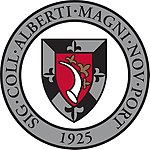This article may rely excessively on sources too closely associated with the subject, potentially preventing the article from being verifiable and neutral. (June 2018) |
Albertus Magnus College is a private Roman Catholic university in New Haven, Connecticut, United States. It was founded in 1925 by the Dominican Sisters of St. Mary of the Springs (now Dominican Sisters of Peace). Its campus is in the Prospect Hill neighborhood of New Haven, near the border with Hamden.
 | |
| Latin: Collegium Alberti Magni | |
| Type | Private university |
|---|---|
| Established | July 13, 1925 |
Religious affiliation | Roman Catholic (Dominican Sisters of Peace) |
Academic affiliations | ACCU CIC NAICU |
| President | Marc M. Camille |
| Undergraduates | 1,200 full-time |
| Postgraduates | 270 full-time |
| Location | , , U.S. |
| Campus | 50 acres (200,000 m2) |
| Colors | Blue and white |
| Nickname | Falcons |
Sporting affiliations | NCAA Division III – GNAC, ECAC |
| Website | albertus |
History
editAlbertus Magnus College was founded in 1925 by the Dominican Sisters of St. Mary of the Springs. The dedication speaker was James Rowland Angell, the president of nearby Yale University. All classes and offices were first housed in Rosary Hall, a Palladian-style mansion that has since been converted for use as the institution's main library. The college's first chaplain, Rev. Artur Chandler, stated that the college's initial goal was to educate women "to become thinkers and leaders and the noble among the ladyhood of the future."[1]
By 1940 the campus had expanded to its current 50 acre size and absorbed a variety of surrounding gilded-era mansions for use as dormitories and office space. The school became known for its strict liberal arts curriculum that required four years of Latin or Greek study.
Originally a women's college, the institution became coeducational in 1985 to some controversy, led by its longtime president Julia M. McNamara.[1] Albertus Magnus College was the last Connecticut college to go co-ed. The 1980s also brought a series of construction projects to the campus, including new classroom space and a new athletic center. The first graduate program, a Master of Arts in Liberal Studies, was offered in 1992.
Organization
editAlbertus Magnus is presided over by a board of trustees. A 1968 reorganization of this leadership opened 80% of spots to secular personnel while continuing to reserve 20% for members of the Dominican Sisters of Peace.
Academics
editIn addition to undergraduate majors, minors and concentrations, including pre-professional preparation, there are graduate programs in art therapy, mental health counseling, addiction counseling, leadership, liberal studies, fine arts in creative writing, human services, business administration, education, instructional design, management and organizational leadership.
As of 2022, the university has a 100% acceptance rate with a student body that is 15% male and 85% female.[2]
Campus
editThe campus is located about two miles (2 km) from the central campus of Yale University in a residential area known as Prospect Hill near the border with Hamden. The neighborhood is on Prospect Street just above Edgerton Park and near East Rock.
The institution uses several of the area's historic 19th century mansions as residence hall and administrative building. A number of these are contributing properties of the Prospect Hill Historic District.
Athletics
editAlbertus Magnus College teams participate as a member of the National Collegiate Athletic Association's Division III. The Falcons are a member of the Great Northeast Athletic Conference (GNC). Men's sports include baseball, basketball, golf, ice hockey, soccer, tennis and swimming & diving; while women's sports include basketball, field hockey, lacrosse, soccer, softball, ice hockey, swimming & diving, tennis and volleyball.
Notable people
editAlumni
edit- Ellen Bree Burns, U.S. federal judge[3]
- Stephen Harding, attorney and member of the Connecticut State Senate
- Margaret Heckler, Member of the U.S. House of Representatives, Massachusetts (1967–1983), 15th United States Secretary of Health and Human Services, 19th United States Ambassador to Ireland[4]
- Jacqueline Noonan, pediatric cardiologist; described Noonan syndrome and hypoplastic left heart syndrome[5]
- Dianne Pinderhughes, American Political Scientist
- Marco Rafala, Novelist
- Lauren DeStefano, Author
- Margaret L. Drugovich, medical researcher
- Marilyn Travinsky, politician
Faculty
edit- Marcella Boveri, biologist
- Lawrence J. DeNardis, U.S. Congressman and University of New Haven president
- Alice Mattison, novelist and short story writer
- Dorothea Rudnick, biologist
- Suzanne W. Tourtellotte, astronomer
- Grace Evelyn Pickford, biologist
- Nuala Archer, poet
References
edit- ^ a b "The View From: Albertus Magnus College". New York Times. 5 November 1989. Retrieved 30 January 2015.
- ^ "U.S. News & World Report: Albertus Magnus College". Retrieved 30 January 2015.
- ^ "Ellen Bree Burns". Federal Judicial Center. Retrieved 30 September 2013.
- ^ "Margaret Heckler". Biographical Directory of the United States Congress. Retrieved 30 September 2013.
- ^ "Jacqueline Noonan". Castle Connolly "National Physician of The Year Awards". Archived from the original on 14 March 2013. Retrieved 30 September 2013.